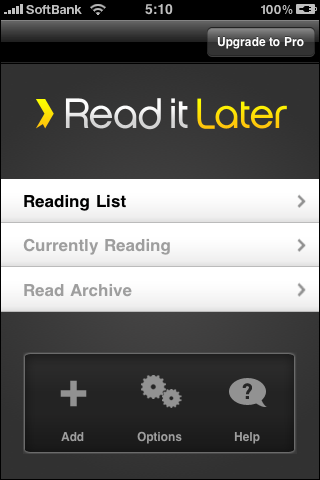

- #INSTAPAPER READ LATER ANDROID#
- #INSTAPAPER READ LATER PASSWORD#
- #INSTAPAPER READ LATER DOWNLOAD#
- #INSTAPAPER READ LATER FREE#
Like Instapaper, Pocket offers a clutter-free reading and viewing experience as well as the capability to sync across all devices. Pocket is another app that’s been around for awhile, it was the original Read It Later app. Pocket: Because You Can Bring It Everywhere
#INSTAPAPER READ LATER FREE#
The search engine comes with the free version, this time there’s no need to upgrade. You can make Instapaper your homepage and never need to leave it again. On the homepage, you can conduct a search and results are quite spectacular. The text highlights the words as you read. This, of course, is part of your upgrade. That’s right, you can create a playlist and have the article read out loud to you while driving, exercising, or sleeping.

#INSTAPAPER READ LATER DOWNLOAD#
If you go back and forth between browsers on your different devices, you can log in and download the respective extensions. An Instapaper icon will appear in your reader toolbar.
#INSTAPAPER READ LATER PASSWORD#
It’s simple, just add your email and create a password and voila. All you need to do is download the app Instapaper. With Instapaper, you can “save anything,” “read anything,” and highlight and add notes, and much, much more.
#INSTAPAPER READ LATER ANDROID#
Instapaper has been around for a few years and is a popular content bookmarking tool for both iOS and Android devices. Instapaper: It’s All About the Highlights So why haven’t you already asked about such an app yet? Because, in fact, there are two apps that have been around for a few years, and with recent updates, they help you manage your read-it-later content so that you will indeed read them later. Technology is too advanced today not to offer this service. You should be able to save your articles (or videos and/or podcasts) to read (or view and/or listen) at your convenience and on any of your gadgets (phone, iPad, tablet, Kindle, computer, or other), and you should be able to find the exact article you want without hassle. But to what utility? Do you really go back and read them? How many of these articles did you actually save this way? Will you even find the article you want at the moment you want it, or will you have to scan and search endlessly because your list of to-read-later articles is way too long or seriously stress-inducing?įrom an IT tech perspective, there’s no reason this should happen. Both these processes, the tabbers or the bookmarkers, so to speak, get what they want: saved articles to read later. Some of us just bookmark it using the respective shortcuts offered by the various web browsers. Some of us just keep the tab open until there’s either too many open sites or your computer crashes. When we find good articles to read, we want them, but we don’t always have the time to read them right there. Though the information is vast, the sources are not always the most reputable or responsible. There is a wealth of information on the web. And the action is prompted by the right app. The reason: organization, or lack thereof.

But reading the articles we save isn’t something we do as often.

Saving articles to read later is something we do we save. :Using an App that Actually Helps You Read that Article Later


 0 kommentar(er)
0 kommentar(er)
